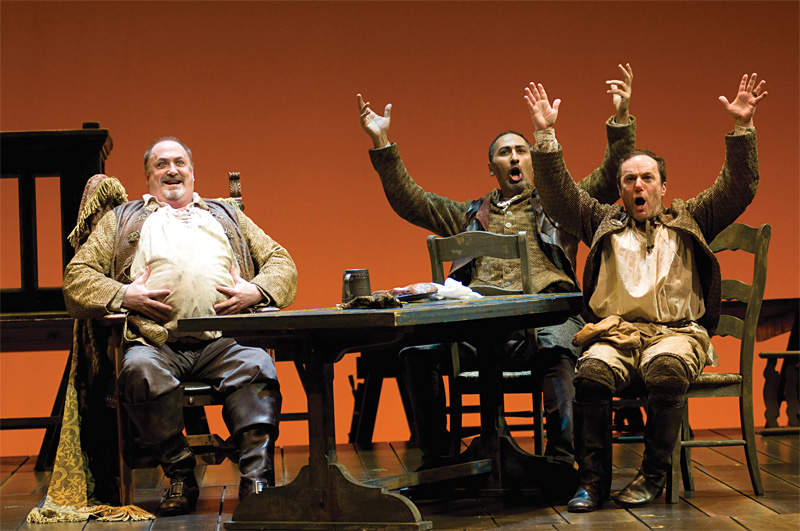All 10 singers in the cast of Seattle Opera’s new production of Verdi’s final opera (which opened Saturday) make their roles vivid and hold their own. This is the first Falstaff I’ve seen, I think, where no one gets lost in the shuffle.
As young lovers Nannetta and Fenton, Anya Matanovic and Blagoj Nacoski are as fresh as ingenues in an MGM musical. Weston Hurt, as Ford, who thinks Falstaff is cuckolding him, brings his solo scene some true pathos. And popular mezzo Stephanie Blythe, who can do no wrong, expands her vastly diverse repertory—for SO alone, the larger-than-life tragic roles of Aida‘s Amneris, the Ring‘s Fricka, and Carmen—as an imposing Dame Quickly. Leading the Gold Cast is Peter Rose in the title role; his baritone is versatile and nimble rather than (as his voluminous fat suit might have suggested) stentorian. Everyone grasps the opera’s opportunities for broad comedy, though some of the shtick and mugging comes off as trite. (The cast might have benefited from seeing last week’s “Hellfire” burlesque revue at the Triple Door, starring Inga Ingenue and Evilyn Sin Claire, which showed how sharp and sophisticated bawdiness can be.)
The production’s loveliest moments made me wish it had all been equally so—especially the sudden ravishments of the silhouette tableaux at the end of Act 2 and Act 3, Scene 1, and the galaxy of wooden chairs suspended from wires, representing the spreading crown of an oak, in the final outdoor scene. SO’s previous Falstaff, in 2001, was traditional and representational, but Donald Eastman’s set for these productions is simply a raised platform along the back and sides of the stage, surrounding a performing space. I heard audience speculation that this is a money-saving scheme; maybe, but it does effectively sidestep the anachronism of making a humble Elizabethan tavern and cottage occupy an entire stage. (The Met production gives Ford a home that looks roughly the size of the Gates mansion.)
Director Peter Kazaras has his cast dress and warm up onstage, in full view of entering operagoers, for about a half-hour before the first downbeat. He also keeps them onstage to watch, as we do, scenes they aren’t singing in. In thus blurring the divide between performer and observer, he drew inspiration from Falstaff‘s final ensemble—”All the world’s a joke,/Man is born a fool,” which includes the audience in the opera’s moral. It’s a movingly embracing envoi to the world from this most humane of composers.







